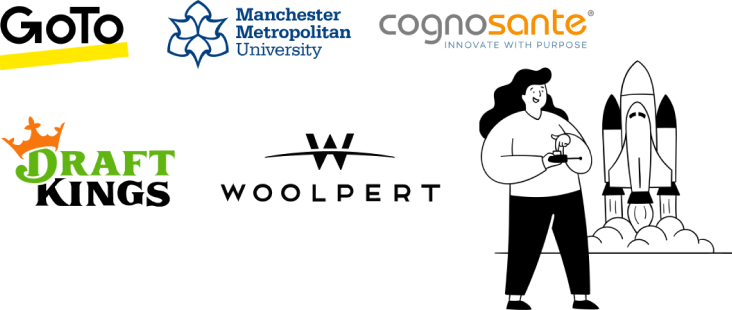Imagine your employee has a small query about the conditions for applying a health insurance policy to ailments.
But if answering an employee's query takes longer than expected because your HR teams are busy or your team is unclear about clauses or other conditions, you can contemplate your people's plight and frustration.
This is just one scenario. There are multiple scenarios for your employees. They seek relevant information to satisfy work-related queries.
While making information available is challenging through manual processes, chatbots can help address the pain points.
Grand View Research predicts that the global chatbot market size will grow at a CAGR of 23.3% from 2023 to 2030 from its value of $5,132.8 million in 2022.
Just as chatbots are becoming primary choices for enterprises to handle customer support, businesses also realize the need to implement chatbots for employee support.
However, it is a common scenario for SMBs and enterprises to leverage FAQ-based chatbots.
The very fact is that FAQ-based chatbots need to be more varied and scalable.
Generative AI can be highly transformative to generate NLP-based content and answers.
Service desks can use exceptional content-generation capabilities to produce GenAI-powered knowledge bases to enhance employee IT support.
Generative AI-powered knowledge bases can be a great source of relevant information, helping to clarify problems and solve them better than FAQs.
1. Concerns with chatbots built with FAQs
Businesses that want to solve employee problems with chatbots must know the limitations of FAQs.

Less effective in handling complex and ambiguous queries
Chatbots that retrieve answers from the predictable answer templates can only provide answers from the predefined templates. If questions come outside the built-in question cards, they repeat and are less likely to handle complex and multistep queries.
Language barrier
Basic chatbots can only understand English, including a handful of other languages. They find it difficult to understand local dialects or other regional languages. Users’ queries may go unnoticed in this case.
Lack of cognitive intelligence to build human connection
FAQs-based chatbots use predefined resources, making them unable to observe and learn patterns in user queries. It is difficult to discern when to escalate a query to a human agent for improved user experience.
Scalability issues
Employee queries can scale in peak times of particular seasons. Other than predictable scenarios, handling questions in an ongoing session can become overwhelming and unmanageable. As knowledge bases remain dormant, chatbots can look repetitive.
Lack of empathy and personalization
FAQ-based answers sound too general and lack empathy. Users love connecting with a system that addresses them personally and helps solve queries empathetically.
2. What is a generative AI-powered knowledge base for employee IT support?

Generative AI, layered on employee IT support to retrieve information from large language models or also help automate knowledge base buildup through constant learning from past or ongoing interactions, is GenAI-powered knowledge for employee IT support.
GenAI-powered knowledge base improves search performance and delivers domain-specific answers related to industry-wide queries by applying RAG search on top of the LLM data.
For example, if a user complains about having login issues into a CRM app, a generative AI chatbot can help. Despite having no pre-programmed troubleshooting data, Generative AI can analyze previous user complaints and log history into applications. Later, by combining these details with generative capabilities, GenAI can produce relevant answers to remove CRM login issues.
3. FAQs vs. Knowledge Base chatbots for employee IT support
FAQ chatbots and Generative AI-powered knowledge bases have some significant differences. Let’s find them.

Custom response capabilities:
FAQ-based chatbots surface information only for known scenarios built on programmed knowledge sources. Custom answers are very rare.
Generative AI-powered knowledge bases use large language models to adapt to a wide variety of searches and, hence, are very scalable to provide custom responses.
Predictive understanding:
FAQs follow sequential learning. They can only predict answers one at a time and struggle to predict future utterances.
Generative AI-powered knowledge bases encompass massive datasets that help them gain amazing predictive understanding to surface answers for predictable and unpredictable scenarios.
Human-like response generation
FAQ-based chatbots can incorporate limited datasets, hindering their capability to generate well-defined human-like responses using NLP.
Trained on large datasets, the generative AI-powered knowledge base can improve NLP understanding to generate humanized answers.
Ability to understand long conversations:
Due to their limited training data, FAQ-based chatbots need help to derive contexts from long sequences of sentences. Answers delivered may contain inaccurate or irrelevant context.
Generative AI chatbots can easily understand the contexts of long conversations and multi-step questions in ongoing conversations, improving the accuracy and relevancy of answers.
5. Why GenAI powered knowledge base for your employee IT support

Having generative AI-powered knowledge bases to handle your employee IT support offers several amazing advantages for your employees, including customers.
Let’s explore these compelling reasons to leverage GenAI-powered knowledge bases.
Anytime, anywhere, employee support
Whether your teams work remotely or in-house, they can connect with knowledge-base-built chatbots anytime and anywhere and get information to get work done.
Self-service for common to critical issues
Employees can leverage knowledge bases powered by LLM to fetch information related to common and critical issues autonomously. This helps speed up work progress as human intervention diminishes.
Rapid response delivery
Having been trained with massive datasets, GenAI-powered KBtakes less time to process NLP queries and retrieve answers, giving users a fantastic experience in problem resolution and productivity improvement.
Accuracy and relevance of information
Knowledge bases prepared with LLMs efficiently and effectively remove inaccuracies from generated answers by utilizing massive datasets. Information accuracy deepens user trust and growing adoption.
Scalability for increased issues
IT can receive increased issues from users for a certain period. Unlike FAQ-based chatbots, generative AI-powered knowledge bases enable IT to handle a growing number of requests and mitigate the impacts.
Multilingual support
The training data can be manipulated to improve language proficiency through exposure to various languages. This results in generative AI-powered KB understanding and surfacing responses for users proficient in local languages.
Elevate agent efficiency
Agents leverage generative AI-powered knowledge bases to increase information search and get AI suggestions or recommendations to accelerate service desk responses to improve user experience.
Boost change management
Self-service can extend its automation compared to FAQ-based knowledge bases through consolidated knowledge search and complex query resolution. This increases user interest in supporting change management and fostering digital transformation with Generative AI.
6. What is a seamless way to build GenAI-Powered KB for your employee support?
The most seamless way to train your generative AI-powered knowledge bases for employee IT support is a no-code platform.
A SaaS-based platform is intuitive for implementing workflows without writing a single line of code.
To implement industry-based workflows, you can upload knowledge articles related to different industry-wide use cases by adding your external articles through integrations with SharePoint, Dropbox, Google Drive, CRM, ERP, etc.
A no-code chatbot builder like Workativ leverages LLMs for its SaaS-based Generative AI chatbot. It allows easy article uploads and setup in just a few iterations.
To build your generative-AI-based chatbot, you can refer to Workativ’s tutorial.
7. Why choose Workativ for a GenAI-Powered knowledge base for your employee support?
Workativ allows users to implement workflows for HR and IT support use cases.
Building your workflows does not require coding. All you need to do is prepare knowledge articles, integrate them with the LLM platform, and set up your chatbot.
By applying flexible integration for MS Teams, Slack, or web widgets, you can allow your users to leverage generative AI knowledge articles and improve self-service.
8. How to use Workativ to build GenAI-Powered KB for your employee support?
It is easy to get started and set up for LLM-powered knowledge search for your employees with Workativ.

Sign up with Workativ
Choose your knowledge sources, such as websites, SharePoint, Google Drive, etc, to improve employee queries
Customize your workflows based on use cases
Build a workflow for human touch during critical issues
Deploy your generative AI-powered knowledge bases in your preferred channels, such as MS Teams, Slack, and others
Improve performance with continuous tweaks using dashboard analytics
Workativ ensures businesses can overcome the challenges of FAQ-based information search and improve user experience using generative AI knowledge bases.
For use cases of IT and HR support, you can apply Workativ’s LLM-powered knowledge bases and turn them into powerful LLM searches for your employee queries. Implement easily inside your enterprise workflows and improve workplace productivity.





